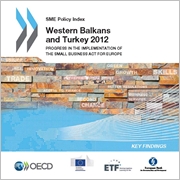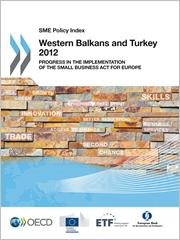SME Policy Index: Western Balkans and Turkey 2012
Progress in the Implementation of the Small Business Act for Europe
|
KEY FINDINGS PUBLICATION
Date of publication |
Launch event: Zagreb, Croatia, 23 October 2012 A preliminary version of this report was released at an entrepreneurship summit co-hosted by the Croatian government, the European Commission and the South East European Centre of Entrepreneurial Learning. >> Press release (pdf) >> Key findings (pdf) >> More about the SME Policy Index Browse the book online for free or buy a paper copy Access for subscribers to OECD iLibrary Access for government officials with OLIS accounts Order from your local distributor About the report
The eight economies of the Western Balkans (Albania, Bosnia and Herzegovina, Croatia, Kosovo*, the Former Yugoslav Republic of Macedonia, Montenegro and Serbia) and Turkey differ significantly in size, income level and economic performance. They are also in varying stages of the EU accession process.
In spite of differences, economies of the region share common features. The importance of small- and medium-sized enterprises (SMEs), which account for as much as 92% of all businesses in some economies is, perhaps, the most salient of them. SMEs generate between 61%-81% of private sector employment and make up the largest share of total value added. A sluggish recovery from the global economic crisis – forecast at 1.1% for the region in 2012 – has affected SMEs and entrepreneurs severely. In order to overcome the present difficult conditions, the governments from the Western Balkans and Turkey are focusing on effective short- and long-term reforms to unleash the potential of SMEs to generate growth and new jobs.
Drawing on its 2007 and 2009 editions, the SME Policy Index 2012 monitors progress against previous evaluations and lends support to policy makers in developing the SME sector. Built on a set of 108 policy indicators, it provides a framework to assess convergence of national SME policies with the ten principles of the Small Business Act for Europe (SBA), identifies strong and weak points in policy design and implementation, and provides a list of priority actions for reform in each economy. For the first time this year, the Index includes Turkey. * This designation is without prejudice to positions on status, and is in line with UNSCR 1244 and the ICJ Opinion on the Kosovo declaration of independence.
|
Related Documents



